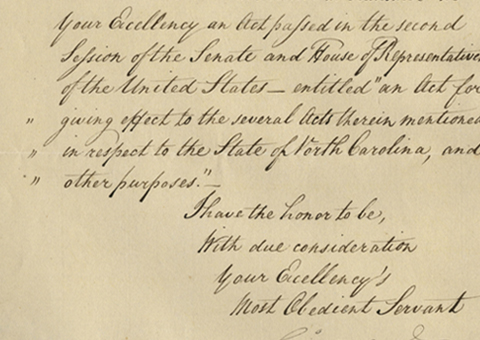Sold – Jay Lays Out the Rules and Course of Conduct to Be Followed by Opponents of the War of
The United States went to war in June 1812 because Great Britain had violated U.S. sovereignty in ways that suggested that the new nation was still a colonial entity, subject to imperial whim. By May 1812, the Jeffersonian Democratic-Republicans in Congress had developed a consensus that there was no alternative to war...
The United States went to war in June 1812 because Great Britain had violated U.S. sovereignty in ways that suggested that the new nation was still a colonial entity, subject to imperial whim. By May 1812, the Jeffersonian Democratic-Republicans in Congress had developed a consensus that there was no alternative to war if national honor were to be maintained. Most Federalists opposed the war, seeing it as a premature, costly, futile, and partisan venture that was likely to produce little good and much evil. It also risked ruining future relations with the British and throwing the nation into the arms of Napoleon and pro-French interests. The best way to bring the conflict to an end, most Federalists agreed, was to oppose it. But how to do so without appearing to seem treasonous was the difficulty.
One of the early nation’s foremost diplomats, in 1782 John Jay, along with John Adams and Benjamin Franklin, negotiated and signed the treaty of peace with Great Britain. When he returned to Congress, he had already been appointed Secretary of Foreign Affairs. In 1787, he authored three of the articles now collectively called “The Federalist”, in which he, James Madison and Alexander Hamilton argued effectively in support of ratification of the new Federal Constitution. In 1789, Washington appointed him the first Chief Justice to the U.S. Supreme Court. In 1794 Jay was appointed envoy extraordinary to Great Britain, in order to seek a resolution to continuing conflicts on the western border, and in commercial relations. The result of this was the controversial Jay’s Treaty, which was approved of by the Washington administration. Upon his return home, Jay found that in his absence, he had been elected Governor of New York at Alexander Hamilton’s behest. He was a very popular Governor who fought for many political reforms including judicial reform, penal reform and the abolition of slavery. Jay retired from office in 1801 but remained active in public life. In 1812, with the Federalist Party in decline, he remained one of its most notable stalwarts, and was looked to for advice. Peter Van Schaak was a New York lawyer who had been a Tory during the Revolution, and after the Revolution worked for British/American reconciliation. He was therefore horrified at the declaration of war in June 1812 and wrote Jay for his counsel on how to respond. Jay also viewed the war with disfavor and responded with a virtual dissertation on ethics and war dissent.
In his Autograph Letter Signed, estate at Bedford in Westchester, July 28, 1812, to Van Schaack, he outlined the ethical rules and course of conduct to be taken by opponents of the War of 1812 after its official declaration. He starts with a general principle, saying “…No event that is highly interesting to our country can be viewed with indifference by good citizens; and there are certain occasions when it is not only their right, but also their duty to express their sentiments relative to public measures.”?He then assesses the war and the obligation of those who oppose it to maintain their beliefs. “In my opinion, the declaration of war was neither necessary, nor expedient, nor seasonable [timely]; and I think that they who entertain this opinion do well in expressing it, both individually and collectively on this very singular and important occasion.” But he included this important qualification: “As the war has been constitutionally declared, the people are evidently bound to support it in the manner which constitutional laws do or shall prescribe.” Moreover, he was concerned about an organized opposition. “As to town meetings on the subject…when convened, their proceedings and resolutions should be decided and firm; and they should also be temperate and decent…Harsh and violent expressions neither convince nor persuade…The irascible passions when highly excited are difficult to control, and sometimes produce or lead to events which are to be deprecated; commotions tending to a dissolution of the Union, or to civil war, would be serious evils.” Lastly, he adds that he does not want to be a spokesman for anti-war sentiments. “I do not hesitate to express these sentiments on proper occasions, but it would not be pleasant to be quoted in newspapers, on handbills or public speeches.” This important letter is quoted in the book “John Jay” by George Pellew.

Frame, Display, Preserve
Each frame is custom constructed, using only proper museum archival materials. This includes:The finest frames, tailored to match the document you have chosen. These can period style, antiqued, gilded, wood, etc. Fabric mats, including silk and satin, as well as museum mat board with hand painted bevels. Attachment of the document to the matting to ensure its protection. This "hinging" is done according to archival standards. Protective "glass," or Tru Vue Optium Acrylic glazing, which is shatter resistant, 99% UV protective, and anti-reflective. You benefit from our decades of experience in designing and creating beautiful, compelling, and protective framed historical documents.
Learn more about our Framing Services






































































































